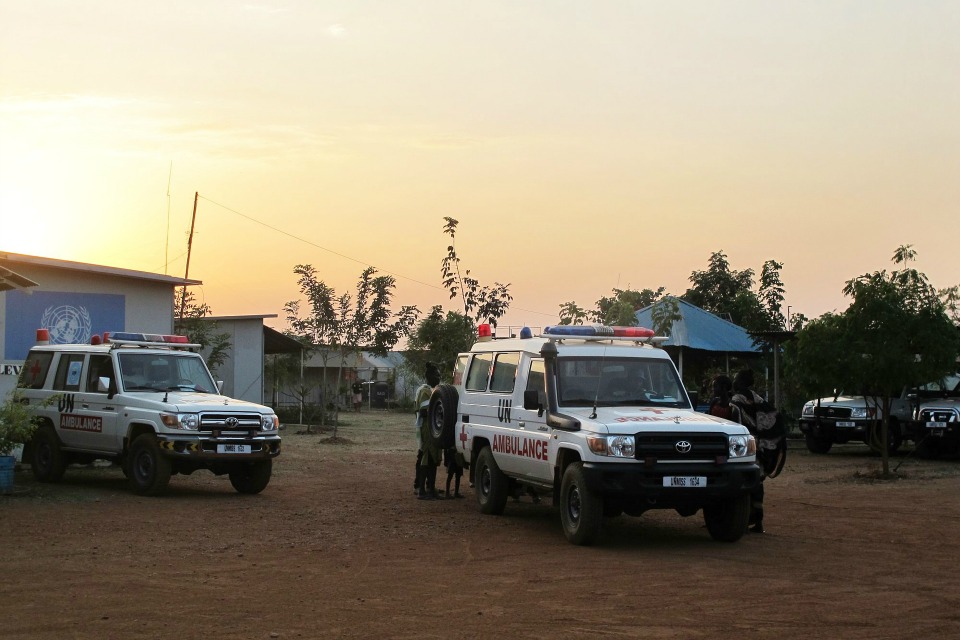"Medical workers continue to be injured and killed as they work to save the lives of others"
Ambassador Peter Wilson, UK Deputy Permanent Representative to the United Nations, statement on attacks on medical personnel and facilities in the UN Security Council.

Thank you Mr President.
And I’d like to thank the Secretary-General for the clarity of his briefing and sharing his recommendations with us today. These ideas will help us protect - and prevent attacks on - medical personnel and their places of work. The United Kingdom welcomes this important contribution.
At the outset, I do want to pay tribute to Dr Joanne Liu and to Peter Maurer from the Medecins Sans Frontieres and ICRC (International Committee of the Red Cross), respectively. And I wanted just to highlight one thing that each of you said to us. Dr Liu, you said to us that throwing medical impartiality to the wind is becoming a new norm of warfare. Mr Maurer, you said we must show that international humanitarian law remains relevant for people bearing the brunt of war. That is a wakeup call for this Council. You and your colleagues are carrying out vital work, so often in the most harrowing of conditions, so often at great risk to yourselves.
Sadly, Mr President, five months since the adoption of resolution 2286, the overwhelming dangers facing Medecins Sans Frontieres, the International Committee of the Red Cross and others operating in conflict zones are still painfully apparent.
Despite resolution 2286 and despite the clear protections provided under international humanitarian law, medical workers continue to be injured and killed as they work to save the lives of others … in Syria, in Yemen, in South Sudan, in all the countries that Mr Maurer listed and in so many places around the world.
But let’s be honest here, the most starkly this is on display is in Aleppo. This is not a propaganda point, it’s a fact. We’ve just heard today about air strikes against the two largest remaining hospitals in rebel-held eastern Aleppo. That is a fact. This Council – we – cannot hide behind the passive voice. We need to be clear. The only air forces carrying out strikes in eastern Aleppo are the Syrian and Russian air forces. That is also a fact. As the Secretary-General said just now, those using ever more destructive weapons know that they are committing war crimes.
Aleppo is now a city which is synonymous with suffering. It is a city synonymous with medics working by the lights of their phones with only the most basic supplies. It is of dust and unrelenting bombardment; a sickening test bed for even crueler, even more barbaric weapons. Syria and Russia bear full responsibility for these atrocities.
And yet this is just the tip of the iceberg. While 400,000 people have died as a direct result of the conflict, the secondary death toll - as a result of the destruction of the healthcare system - will be much higher. Access to vaccinations, neonatal care, maternal healthcare, women’s healthcare – all these things have all but disappeared. Once-extinct diseases like polio have returned, and measles, typhoid, hepatitis, and tuberculosis are now reaching dangerous levels.
And in cities like Madaya, we hear heartbreaking stories like that of Ghina Ahmad Wadi, shot by a regime sniper last month. For over two weeks, the regime denied her medical evacuation before she eventually received the attention she needed. Why? Together with the forced removal of medical supplies from convoys, such actions amount to a calculated dismantling of Syria’s healthcare system.
Our concern also extends to Yemen. 14 million people are in need of humanitarian assistance. Improving access to them is a top priority for the United Kingdom. We call on all sides to improve the flow of essential medical and humanitarian supplies to alleviate the suffering.
We also take very seriously reports of violations of international humanitarian law in Yemen, including attacks on medical facilities. All sides must conduct thorough and conclusive investigations into all incidents where it’s alleged that international humanitarian law has been breached.
Mr President,
Wherever in the world international humanitarian law is breached, and whoever by, we must ensure accountability. We owe it to the people of Aleppo, and to countless more around the world. To do so, it’s clear that we need to gather the evidence and collect the data to bring this about. We welcome the Secretary General drawing attention to this in his recommendations.
Groups like Daesh, who conduct sickening attacks on medical workers and facilities, are no exception. That’s why our Foreign Secretary Boris Johnson announced last week that the United Kingdom, alongside Iraq, will bring a proposal to the UN, calling on the organisation to gather and preserve evidence of Daesh’s crimes in Iraq. We did so because there can be no impunity. We therefore support the Secretary General’s recommendation that where domestic accountability mechanisms are insufficient or inadequate, international accountability mechanisms should be sought, including the International Criminal Court.
I want to conclude by once again stressing the importance of international humanitarian law. Where there is armed conflict, civilians and those who provide medical assistance must be protected. I am proud to reaffirm the United Kingdom’s commitment to upholding these laws. I urge all Council members to follow suit.
Thank you.